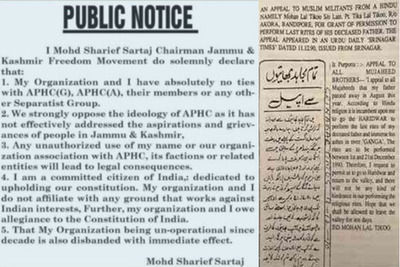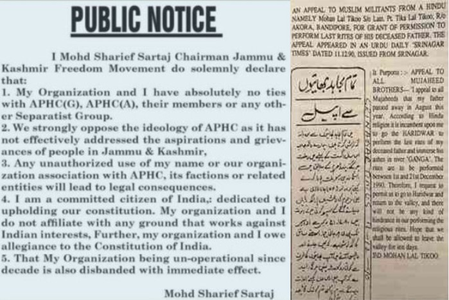

New Delhi, March 30 (IANS) Recently, four associate outfits of the Hurriyat Conference severed their ties with separatism, pledging allegiance to the Constitution of India and vowing never to associate with groups or forums working against the country.
This was announced by Union Home Minister Amit Shah, who hailed the move, stating, "Separatism has become history in Kashmir."
It certainly has, especially after the abrogation of Article 370. All separatist outfits, which once threatened the Union of India from time to time and garnered multi-country support at various international forums, have faded into oblivion -- and so have their friends. Time has come full circle.
For nearly three decades, such outfits furthered the objectives of terrorists, coercing gullible people into submission, killing those who dared to speak out, and driving minorities out of their homes. From 1989 onwards, there was a time in Kashmir when terror and separatist groups forced people to publicly declare an anti-India stance and seek apologies in local newspapers for any acts perceived as pro-India.
Terror outfits also issued threats openly by distributing leaflets or publishing them in local Urdu newspapers. The separatist organisations, operating under the umbrella of the Hurriyat Conference, amplified the climate of fear created by Pakistan-backed terrorist networks and helped justify the violence unleashed -- especially against Hindu and Sikh minorities.
They also provided the financial route for Pakistan-backed outfits and other international groups to keep the pot boiling in Kashmir, organising stone pelting sessions, attacks on security forces, and fanning radicalisation.
Between 1989 and 1992, local Urdu newspapers such as Chattan, Srinagar Times, Aftab, and Alsafa obediently published open threats issued by terrorist groups and their sympathisers. Government employees or anyone with links to Indian organisations was compelled to dissociate themselves publicly.
Among those forced to issue public apologies were two Kashmiri Hindu casual announcers at Radio Kashmir who were targeted. One of them was even shot at. Both had to sever ties with Radio Kashmir publicly through a series of 'apologies' published in Roznama Aftab in September 1990.
Even those locals, especially Kashmiri Pandits, who were required to go out of Kashmir for some reason had to notify about it through ads in local newspapers as otherwise they would be labelled as 'agents' and killed.
After 35 years, the same/similar outfits are now on a course of self-correction. It is their turn to give undertakings and reinforce allegiance to the Constitution and the Union of India. And for this, they are issuing public statements, pronouncing their allegiance to the country.
One of the four outfits to renounce separatism is J&K Tehreeq-e-Istiqlal. Its chairman, Gulam Nabi Sofi, formally disassociated from the All Parties Hurriyat Conference, stating, "I severed my ties with separatist ideology long ago, and today I officially denounce it. I am a true and committed citizen of India and believe in the Indian Constitution."
Similarly, Jammu and Kashmir Freedom Movement (JKFM) chairman Muhammad Sharief Sartaj also announced his complete dissociation from the Hurriyat and other separatist groups, emphasising his commitment to India's national integrity and declaring the dissolution of his organisation.
The other two outfits renouncing separatism were also Hurriyat-affiliated groups, the Jammu and Kashmir People's Movement (JKPM) and the Democratic Political Movement (DPM). JKPM chairman Shahid Saleem stated that neither he nor his organisation had any sympathy for the Hurriyat, adding that it had failed to address the legitimate concerns of the people. DPM's Mohammad Shafi Reshi also distanced himself from the Geelani-led Hurriyat faction, citing its inability to meet public expectations.
It is being speculated that more such outfits will make similar announcements, heeding the Home Minister's call to renounce separatism once and for all.
One of the primary reasons behind this shift is the realisation that the world has changed significantly after the abrogation of Article 370. Crackdowns on terror-support networks have choked funding channels, most instigators are behind bars, and the world is preoccupied with other volatile geopolitical situations. Pakistan, which orchestrated terrorism in Kashmir with the hope of making it an Islamic territory that would eventually merge with it, is now itself in deep crisis.
Pakistan has failed in its designs to replicate a Balochistan-like situation in Jammu and Kashmir, but it did succeed in disrupting social harmony in the region. For three decades, terror and separatist groups in Kashmir waged a one-sided assault on the vulnerable minority Hindu population -- just two per cent of J&K's population. They forced Kashmiri Pandits out, usurping their properties in many cases and fostering animosity that will take a long time to heal.
These outfits are now falling in line, but for three decades, they aided Pakistan's proxy war against India. They also bear responsibility for the persecution of minorities, particularly Hindus.
(Deepika Bhan can be reached at deepika.b@ians.in)
--IANS
dpb/sd